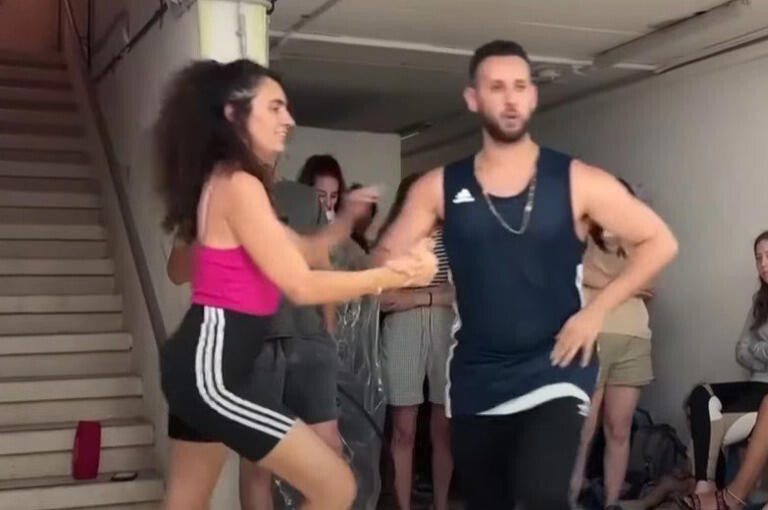
TEL AVIV, Israel – Amidst a relentless barrage of missile attacks on Tel Aviv, Israel's economic heartland, a spontaneous salsa performance in a public bomb shelter offered a poignant moment of levity and defiance for anxious residents. The impromptu show, reported on June 17, 2025, by the Associated Press and other outlets, unfolded as Iranian missile strikes continued to force Israelis into shelters multiple times a day.
On this particular day, as air raid sirens pierced the Tel Aviv sky, residents scrambled into subterranean public shelters. Over a hundred individuals found themselves huddled together in one such facility when, unexpectedly, a man and a woman initiated a salsa dance to music. These Cuban-born salsa instructors, reportedly among those seeking refuge, took it upon themselves to uplift the spirits of their fellow evacuees, transforming a space of fear into one of shared human connection. Their impromptu performance was met with smiles and applause, a brief but powerful antidote to the prevailing tension.
Escalating Conflict Between Israel and Iran
The backdrop to this remarkable scene is a rapidly escalating military confrontation between Israel and Iran, with fears mounting that the conflict could spiral into full-scale regional war. The current surge in hostilities reportedly began on June 13, 2025, when Israel launched what it termed a pre-emptive strike against Iranian nuclear facilities.
The Israeli Defense Forces (IDF) have maintained an aggressive posture. On June 18, 2025, the Times of Israel (TOI) and other news agencies reported that the IDF deployed over 50 fighter jets to conduct airstrikes on centrifuge and missile production facilities located on the outskirts of Tehran, Iran's capital. These recent attacks followed earlier Israeli strikes on Iranian drone bases in western Iran and even the state-run broadcasting corporation in Tehran.
Iran, for its part, has unequivocally stated its intent to continue retaliatory offensives. According to Iran's Mehr News Agency, the Islamic Revolutionary Guard Corps (IRGC) has deployed the new Fatah-1 hypersonic missile, capable of speeds exceeding 6,100 km/h, in its targeted attacks on Israeli air force bases. CNN reported that Iranian missiles were observed detonating in the skies above Tel Aviv in the early hours of June 18, 2025, underscoring the direct and immediate threat faced by Israeli civilians.
The Fatah-1, unveiled by Iran in 2023, is a solid-propellant, precision-guided hypersonic missile with maneuverability both inside and outside the atmosphere. Its claimed ability to penetrate advanced air defense systems has raised significant concerns among Israeli and Western defense analysts. The use of such advanced weaponry marks a significant escalation in the conflict, highlighting Iran's growing military capabilities and its determination to inflict damage on Israeli targets.
Public shelters, once a rarely used precaution, have become a grim reality of daily life for residents in Tel Aviv and other affected Israeli cities. These reinforced underground structures, equipped with ventilation systems and emergency supplies, are designed to protect civilians from missile and rocket attacks. However, the prolonged and frequent need to seek shelter has undeniably taken a toll on the psychological well-being of the population. The salsa performance, therefore, resonated deeply as a symbol of resilience and the human spirit's capacity to find light amidst darkness. It served as a reminder that even in the most perilous circumstances, acts of culture and solidarity can offer moments of much-needed relief and a sense of normalcy.
The international community watches with bated breath as the tit-for-tat strikes continue, urging both sides to de-escalate the situation and prevent a wider regional conflagration. The humanitarian impact of the ongoing conflict, particularly on civilian populations, remains a grave concern. As the sound of sirens becomes an increasingly familiar part of life, moments like the impromptu salsa dance in a bomb shelter serve as powerful testaments to the human will to endure and to find solace in shared experiences, even in the shadow of war.
[Copyright (c) Global Economic Times. All Rights Reserved.]




























